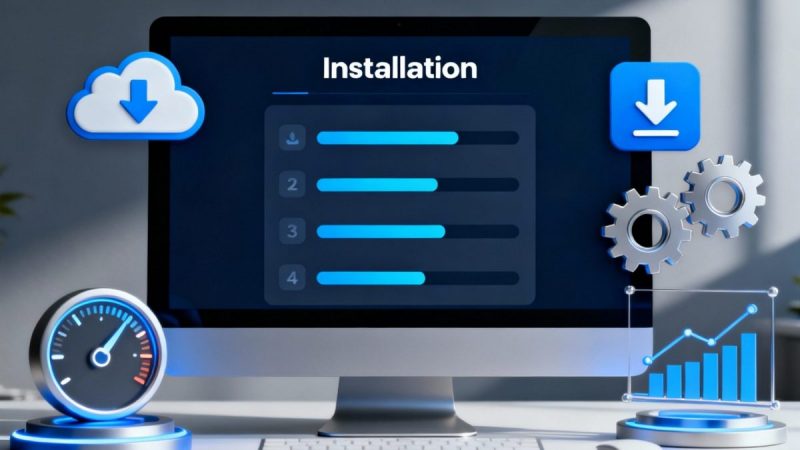ERP and Supply Chain Management – A comprehensive Guide

The ERP & Supply Chain Management Solutions offer various advantages to businesses. It can offer features like- end-to-end process tracking, business automation, resource management, reporting, and analytics to help the business focus on productivity. This blog covers a comprehensive guide to help you understand ERP & Supply Chain Management in a better way.
The businesses are planning to adopt more robust ways to attract growth and profitability for the longer term. The terminologies like Enterprise Resource Planning and Supply Chain Management have dominated the business ecosystem for several years but slowly and gradually it is being overtaken by technology dominant practices. The technology-based ERP software solutions and systems are already empowering thousands of businesses worldwide fueling efficient business management and productivity in significant ways. While there are numerous solutions available in the market to offer businesses more lucrative ways of scaling up, the ERP and Supply Chain Management can be a boon to focus on business-friendly methodologies combining the elements of business, technology, and aspects of growth altogether under a common platform. This is one of the unique solutions to offer a better return on investment for business by enabling productive and profitable strategies.
In the modern world, it is becoming more and more mainstream for businesses to understand how the Key Performance Indicators revolving around ERP, Supply Chain, and Analytics are working to power growth for businesses. It is high time that top-level management should eliminate redundant and monotonous practices to foster increased productivity for employees by enabling automation and business intelligence altogether. Companies of all sizes, be it small, medium, or large, can look forward to software solutions and benefit themselves in terms of both profit and productivity.
Modern Approach: ERP & Supply Chain Management
Modern businesses are well equipped with the market standards and they look towards eliminating unnecessary hassles of business. From paperless accounting to employee productivity, businesses want to keep themselves ahead of the competition. This is the prime reason which fosters the need of implementing solutions like- ERP & Supply Chain Management. It considerably can lower the operational costs by effectively managing the resources and processes of businesses. On the other hand, technology-backed smart solutions can easily catch inconsistencies while enabling positive business practices among the stakeholders.
Enterprise Resource Planning: Managing Integral Elements of Business
An organization can contain various departments and employees working across multiple locations. It might become crucial for businesses to manage integral elements and processes through a dedicated solution. Enterprise Resource Planning focuses on optimizing resources through better planning and strategic management. It revolves around the idea of utilizing businesses resources to clock optimum performance and productivity for businesses without overburdening the workforce. It eases processes to help businesses efficiently manage their resources to get better performance and results promptly. A comprehensive enterprise resource planning solution enables enterprises to keep an active track of resources and helps them to smoothly organize information. It also saves employees time by offering them access to information and enables better productivity to focus on tasks that require more input and effort. It eliminates the need to manually access the scenarios for making decisions which also reduces the risks of errors and inconsistency.
Supply Chain Management: Driving Force towards Organizational Competency
Supply Chain Management can be a driving force to boost an organization’s competency. It can help organizations keep track of all elements responsible for supply chain management. Right from procuring raw materials, managing orders to fulfilling deliverables, it is responsible for end-to-end business processes to ensure better consumer satisfaction and timely assurance. The SCM usually covers everything ranging around- scheduling materials, transportation, order management, after-sales commitments, etc. The software solutions can be used to organize information and enable convenience to fulfill the chain promptly.
The organizations focusing more on timeliness and commitments tend to get more successful in a competitive approach. The supply chain management solutions can assist employees to manage the supply chain more effectively by feeding them with real-time information and data needed to take action promptly. It can also simultaneously help businesses to automate processes more productively without needing human intervention now and then. This can be made possible by using active reporting, analytics, real-time tracking, stock tracking, order status checking, etc.
Integrated Approach: Managing Information for Fostering Business Growth
The businesses and various departments within the organization should come out of independent silos to adopt more integrated ways of organizing information. It should be shared across various verticals through a similar information management system enabling quick access to information. It can be conveniently made possible through solutions revolving around Enterprise Resource Planning and Supply Chain Management altogether. From Managing and integrating resource planning aspects into the business to organizing core elements of the supply chain, the solutions can provide better decision making and ease of information access to achieve desired results.
ERP & SCM Solutions: Competitive Features for Powering Productivity
The ERP & SCM Solutions can help businesses focus on productivity by offering them essential features required to plan, manage and maintain various aspects of an organization which is as follows:
1) Demand Planning Management & Forecasting: Demand is the basic element that requires businesses to plan their stock, resources, and raw materials. The integral approach of ERP & SCM can manage this efficiently by creating order chains while also generating demand for raw materials required. It eases multiple efforts and saves time to meet the demands.
2) Effective Communication & Management: Whether there is a need to procure raw materials or order items from vendors, the software can create communication links and notify various stakeholders as assigned.
3) Order Management: The software offers the capability to generate invoices and waybills to ensure the fulfillment of orders. It can also manage taxation and other compliances effectively.
4) Resource Management: Planning and Managing resources more efficiently for businesses in industrial sectors like- FMCG, Agriculture, Manufacturing, Logistics, etc.
5) Reporting & Analytics: Reporting and data analytics is an important aspect of any solution to ease decision making and logical support. From tracking orders to ensuring trackability of revenue, the software is capable of offering information proactively.
6) Vendor Coordination & Management: The third party or direct vendors can be connected through a common dashboard to enable ease of order management and communication. It can also be useful to keep a track of pending payments and credits for vendors or partners.
7) Human Resource Management: The ERP solutions can offer various features to schedule employee hours and manage workload. This helps in effectively ensuring work hours and payment terms for employees.
8) Accounting: It is an integral aspect of any business. The software solutions are smart enough to offer accurate accounting with taxation compliances. It can also ease tax filing and ensure clean bookkeeping of business accounts.
9) Logistics & Delivery: Being a crucial element of the supply chain, order tracking and delivery need to be sorted well through a dedicated dashboard. The ERP & SCM solution can offer varied ways to ensure on-time delivery of orders. It can also be integrated well with third-party logistics vendors.
Business Intelligence & Automation: Key Drivers of Next-Gen Solutions
The decision-making for businesses can be a complex task but next-gen solutions have the technology and ability to enable data-driven statistics. It can assist decision-makers based on various aspects like- sales, orders, inventory, demand forecast, costs, etc. Automation and reporting can help to accelerate processes which can in turn foster ease of management.
Cost & Affordability: How to Choose ERP & Supply Chain Management Solutions
The companies can have various options while choosing solutions for ERP & SCM. They can either opt for custom development or might purchase licensed software from the market. The use of open-source frameworks like- Moqui & OffBiz does offer organizations a wide range of options to get a fully functional customized solution at competitive prices. This can certainly be the best option for companies with larger employee sizes as it may help them to save huge costs while getting a solution that can efficiently achieve desired goals.
NOI Technologies offer various solutions based on an open-source framework to provide full-fledged ERP & SCM software along with development, consultancy, and training support. The team of experts can assist best solutions and features in competitive pricing to help you get desired solutions for your business.






